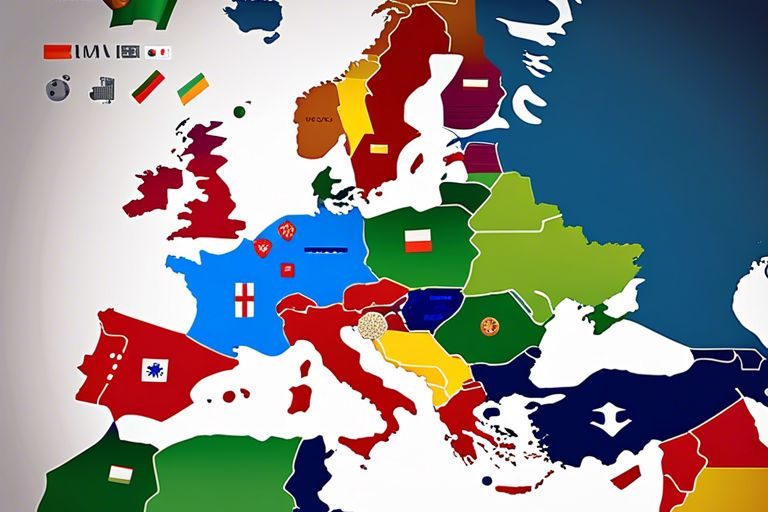Regulatory Landscapes – iGaming Across Europe

Many countries in Europe have distinct regulatory frameworks for the iGaming industry, making it a complex landscape for operators to navigate. Understanding the varied regulations is crucial for companies looking to expand their online gaming services across the continent. From stringent licensing requirements to differing tax regimes and responsible gaming measures, each country presents unique challenges and opportunities for iGaming businesses.
The iGaming Ecosystem
Definition and Forms of iGaming
While the term iGaming encompasses a broad spectrum of online gaming activities, it primarily refers to the online gambling industry, including casino games, sports betting, poker, bingo, and more. These activities are conducted through the internet on various digital platforms, allowing players to wager on games of chance or skill in a virtual environment. The iGaming industry has witnessed significant growth in recent years, with technological advancements and increasing internet penetration driving the popularity of online gaming.
Key Players and Stakeholders in the Market
One of the key players in the iGaming ecosystem is the online operators who provide the platform for players to engage in various gaming activities. These operators range from established casino brands to new start-up’s, each offering a unique gaming experience to attract and retain customers. Additionally, software providers play a crucial role in supplying the games and technology that power the online casinos, ensuring a seamless and engaging user experience.
Ecosystem: Regulatory bodies and government agencies also play a vital role in shaping the iGaming landscape. They are responsible for enforcing laws and regulations, ensuring fair play, protecting players, and preventing criminal activities such as money laundering. Non-governmental organizations, industry associations, and responsible gambling advocates also contribute to creating a sustainable and responsible iGaming environment.
Overview of European Regulatory Frameworks
There’s no single unified approach to regulating the iGaming industry across Europe. Each country has its own set of laws and regulations in place, leading to a complex and diverse regulatory landscape. Understanding the different regulatory frameworks is crucial for operators looking to navigate the European market.
The Role of the European Union in iGaming Legislation
Role: The European Union plays a significant role in shaping iGaming legislation across its member states. While the EU doesn’t have direct authority over gambling regulations in individual countries, it has issued various directives that impact the industry. The EU seeks to promote fair competition, consumer protection, and responsible gaming practices through its directives, influencing how member states regulate their domestic iGaming markets.
Diversity of iGaming Regulations Among European Countries
Legislation: The diversity of iGaming regulations among European countries can present challenges for operators seeking to enter multiple markets. Each country has its own licensing requirements, tax rates, and restrictions on game types, creating a complex web of regulations to navigate. Understanding the nuances of each market is crucial to ensure compliance and operational success.
EU Member States' Regulatory Approaches
Many EU Member States have adopted varying regulatory approaches towards iGaming, resulting in a diverse landscape across Europe. These approaches range from stringent regulations to more liberal frameworks, reflecting the different attitudes towards online gambling within the region.
The Stringent Model: The United Kingdom
Model: The United Kingdom is known for its stringent regulatory framework for iGaming. The UK Gambling Commission oversees the licensing and regulation of online gambling operators in the country, ensuring strict compliance with laws and regulations. Operators are required to adhere to robust responsible gambling measures, stringent player protection guidelines, and stringent anti-money laundering protocols.
The Liberal Model: Malta
To: Malta, on the other hand, has adopted a more liberal approach to regulating iGaming. The Malta Gaming Authority is the regulatory body responsible for overseeing the sector, providing licenses to operators who meet the necessary criteria. This approach has made Malta an attractive destination for iGaming companies looking to establish operations within the EU due to its favourable tax regime and simplified licensing procedures.
Malta: The country’s proactive stance towards iGaming has helped it become a hub for the industry, attracting a host of international companies to set up operations on the island. Malta’s regulatory framework offers a balance between consumer protection and industry growth, making it a popular choice for iGaming operators.
Recent Changes and Updates in National Legislations
Regulatory: Recent years have seen several EU Member States update their national legislations concerning iGaming to adapt to the evolving landscape. These changes have included updates to licensing requirements, tax structures, advertising restrictions, and measures to enhance player protection.
Legislations: The updates in national legislations reflect a growing recognition of the importance of regulating iGaming effectively to ensure a safe and responsible environment for players. By staying abreast of these changes, operators can navigate the complex regulatory landscape across Europe and ensure compliance with the varying requirements in different Member States.
Licensing and Compliance Essentials
Licensing Requirements Across Jurisdictions
Not all European countries have the same licensing requirements for iGaming operators. Each jurisdiction has its own set of rules and regulations that operators must adhere to in order to legally offer their services to players. Some countries, like the UK, have stringent licensing requirements that include background checks, financial audits, and player protection measures. Others, such as Malta, offer a more streamlined process but still require operators to meet certain criteria to obtain a license.
Compliance Challenges for iGaming Operators
One of the biggest compliance challenges for iGaming operators across Europe is navigating the complex web of regulations in different jurisdictions. Each country has its own rules regarding data protection, responsible gaming, advertising, and more. Ensuring compliance with all of these regulations can be a daunting task, especially for operators who are active in multiple markets.
Understanding the regulatory requirements in each jurisdiction is crucial for iGaming operators to avoid hefty fines, license revocation, or even criminal charges. Implementing robust compliance measures, such as age verification systems, responsible gaming tools, and anti-money laundering protocols, is imperative to maintaining a good standing with regulatory authorities. Staying up to date on regulatory changes and seeking legal guidance when needed can help operators navigate the ever-evolving regulatory landscape in Europe.
Taxation and Financial Regulations
For iGaming operators, navigating through the complex web of taxation and financial regulations in Europe can be a challenging task. Each country has its own set of rules and requirements that operators must adhere to, making it crucial to have a deep understanding of the regulatory landscapes in each jurisdiction.
Comparative Analysis of Tax Regimes for iGaming
To successfully operate in the iGaming sector across Europe, it is vital to have a thorough understanding of the varying tax regimes in different countries. Below is a comparative analysis of tax rates and regulations for iGaming operators:
| Country | Tax Rate |
| United Kingdom | 15% Gross Gaming Revenue |
| Malta | 5% on B2C Revenue |
| Sweden | 18% on Net Gaming Revenue |
Anti-Money Laundering Measures in the iGaming Sector
Laundering iGaming operators are required to implement robust anti-money laundering measures to prevent their platforms from being used for illicit financial activities. These measures are put in place to protect both the operators and their customers from the risks associated with money laundering and terrorist financing.
For instance, operators are required to conduct thorough customer due diligence checks, monitor transactions for suspicious activities, and report any suspicious transactions to the relevant authorities. Failure to comply with anti-money laundering regulations can result in severe penalties, including hefty fines and loss of operating licenses.
The Role of Technology in Regulation
Once again, technology plays a pivotal role in shaping the regulatory landscape of iGaming across Europe. As the industry becomes increasingly digitalized, regulators are faced with the challenge of keeping up with the rapid advancements in technology to ensure a safe and fair gaming environment for consumers. Technology not only enables operators to deliver innovative and immersive gaming experiences but also provides regulators with the tools needed to enforce compliance and monitor activities effectively.
Advances in Technology Affecting Regulation
One of the key advancements in technology that is influencing iGaming regulation is the development of sophisticated data analytics tools. These tools allow regulators to sift through vast amounts of data to detect patterns of potentially harmful behaviour, such as problem gambling or money laundering. By leveraging data analytics, regulators can proactively identify and address regulatory issues, leading to a more efficient and effective regulatory framework.
Impact of Blockchain and Cryptocurrencies on iGaming
Technology has disrupted the iGaming industry with the rise of blockchain technology and cryptocurrencies. These innovations offer several advantages for the sector, including enhanced security, transparency, and efficiency. Blockchain technology allows for the creation of tamper-proof decentralized ledgers, providing a high level of security for transactions and player data. Cryptocurrencies, on the other hand, offer faster and more cost-effective payment solutions, reducing friction for both players and operators.
Impact: The integration of blockchain and cryptocurrencies in iGaming not only streamlines transactions but also mitigates the risks associated with traditional payment methods. However, the decentralized nature of these technologies poses challenges for regulators in terms of monitoring and enforcing compliance. Despite these challenges, the benefits of blockchain and cryptocurrencies in iGaming are paving the way for a more secure and efficient online gaming environment.
The Future of iGaming Regulation in Europe
Predicted Trends and Potential Legislative Changes
All signs point to a continued evolution of iGaming regulation in Europe. Increased scrutiny and tightening of regulations are expected as authorities strive to protect consumers and prevent problem gambling. Harmonization of regulations across European countries may also be on the horizon to streamline operations for iGaming companies who work in multiple jurisdictions.
How iGaming Companies Can Prepare for the Future
As the regulatory landscape of iGaming in Europe evolves, it is crucial for companies to stay ahead of the curve. Adopting a proactive approach to compliance by investing in robust responsible gaming measures and KYC protocols will be crucial. Furthermore, developing strong relationships with regulatory bodies and staying informed about upcoming changes will be vital for long-term success in the region.
Predicted trends suggest that iGaming companies should be prepared to adapt quickly to new regulatory requirements. This may involve allocating resources towards compliance efforts and implementing agile strategies to navigate the changing landscape effectively.
Summing up
Understanding the regulatory landscapes of iGaming across Europe is crucial for operators looking to expand their presence in the region. Each country has its own set of regulations, licensing requirements, and compliance standards that must be adhered to in order to operate legally. By navigating these complexities and staying up-to-date with evolving laws, operators can ensure a successful and sustainable presence in the European market.
Overall, iGaming regulation in Europe reflects a diverse and ever-changing environment. While challenges remain, such as varying tax rates and restrictive regulations in certain countries, there are also opportunities for growth and expansion. By staying informed, flexible, and compliant, operators can navigate the regulatory landscapes of Europe and capitalize on the potential of this lucrative market.
FAQs:
What is iGaming, and what does it encompass?
iGaming primarily refers to the online gambling industry, covering activities like casino games, sports betting, poker, and bingo, conducted through digital platforms.
How does the regulatory landscape differ across European countries?
European countries have distinct regulatory frameworks for iGaming, leading to variations in licensing requirements, tax regimes, and game restrictions.
What role does the European Union play in iGaming legislation?
While the EU doesn’t directly regulate gambling, it issues directives influencing member states’ regulations to promote fair competition and consumer protection.
What are the compliance challenges faced by iGaming operators in Europe?
Operators must navigate diverse regulations concerning data protection, responsible gaming, and advertising across different jurisdictions, posing significant compliance challenges.
What are the key trends shaping the future of iGaming regulation in Europe?
Trends include increased regulation for consumer protection, potential harmonization of regulations, and the need for operators to adopt proactive compliance measures.
Recommended Posts

Payment Processing – The Backbone of iGaming
June 25, 2024

How Online Casinos Are Shaping iGaming
June 25, 2024

Responsible Gambling in Digital Casinos
June 25, 2024



